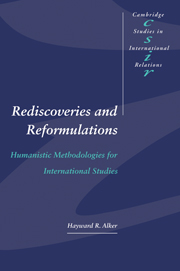Book contents
- Frontmatter
- Contents
- List of figures
- List of tables
- Acknowledgments
- Introduction: Voyages of rediscovery
- Part I Recovering Western antiquity
- Part II The humanistic science of the modern classics
- 4 The humanistic moment in International Studies: Reflections on Machiavelli and Las Casas
- 5 Can the end of power politics be part of the concepts with which its story is told? A Leibnizian reply
- 6 Rescuing “reason” from the “rationalists”: Reading Vico, Marx and Weber as reflective institutionalists
- 7 An Orwellian Lasswell: Humanistic scientist
- Part III Contemporary humanistic reformulations
- References
- Index
- CAMBRIDGE STUDIES IN INTERNATIONAL RELATIONS
6 - Rescuing “reason” from the “rationalists”: Reading Vico, Marx and Weber as reflective institutionalists
Published online by Cambridge University Press: 13 January 2010
- Frontmatter
- Contents
- List of figures
- List of tables
- Acknowledgments
- Introduction: Voyages of rediscovery
- Part I Recovering Western antiquity
- Part II The humanistic science of the modern classics
- 4 The humanistic moment in International Studies: Reflections on Machiavelli and Las Casas
- 5 Can the end of power politics be part of the concepts with which its story is told? A Leibnizian reply
- 6 Rescuing “reason” from the “rationalists”: Reading Vico, Marx and Weber as reflective institutionalists
- 7 An Orwellian Lasswell: Humanistic scientist
- Part III Contemporary humanistic reformulations
- References
- Index
- CAMBRIDGE STUDIES IN INTERNATIONAL RELATIONS
Summary
That we disavow reflection is positivism.
Habermas (1971)North American epistemological discussions in international studies in the 1960s and 1970s were frequently ahistorical and, in a variety of ways, unreflectively “positivistic.” Although positivistic behavioral, classical and dialectical/Marxist traditions of investigation flourished unequally in different parts of the world, it was hard then – and in the graduate programs shaped by professors who achieved senior positions during the Cold War, it is still difficult – to find discussions across these traditions, wherein all participants recognize the intellectual seriousness and scientific aspect of each tradition's best endeavors. Hence, readers of the 1988 Special Issue of Millennium on “Philosophical Traditions in International Relations,” should have been refreshed and enriched, if not always pleased, by its “skepticism of monological answers, totalizing theories, and disciplinary ideologies posing as natural, self-evident truths.” Having witnessed “a loss of awe for the grand theories of international relations,” James Der Derian calls for a reinvigorated “textual politics,” the revalorizing of “a dialogical approach [to the monologue of tradition], recognizing the polyvalent, multicultural, and stratified nature of international relations” (Der Derian 1988).
As a contribution to this dialogue of traditions, which elsewhere I have argued constitutes the international and interdisciplinary study of international relations (Alker and Biersteker 1984), I here recharacterize what Robert Keohane has recently called the “reflectivist” approach to research on international institutions, distinguished in his view by its concern with intersubjective meanings and the embeddedness of contemporary international institutions in preexisting social practices.
- Type
- Chapter
- Information
- Rediscoveries and ReformulationsHumanistic Methodologies for International Studies, pp. 207 - 237Publisher: Cambridge University PressPrint publication year: 1996
- 1
- Cited by



